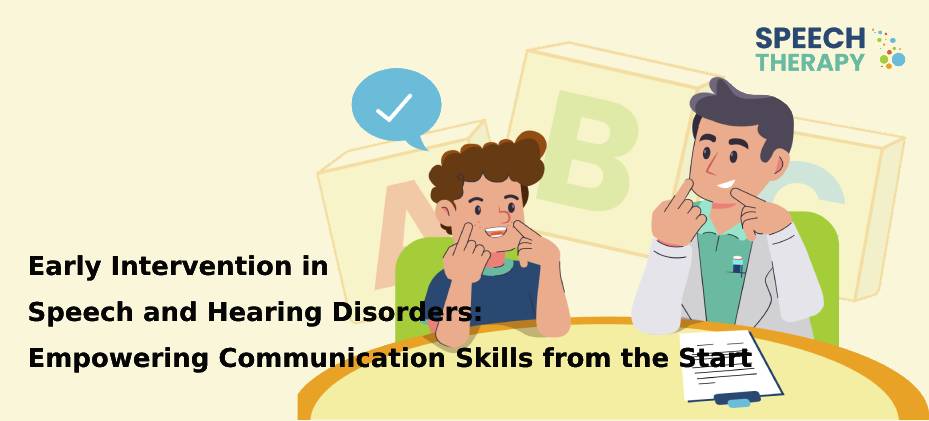 Call Us
Call Us
 Mail Us
Mail Us

Communication is a fundamental aspect of human interaction and plays a vital role in our daily lives. However, for some individuals, speech and hearing disorders can significantly impact their ability to effectively communicate. These disorders can occur due to various reasons, such as genetic factors, developmental issues, or acquired conditions. The impact of these disorders can be profound, affecting a person's social, emotional, and educational well-being.
Early Intervention in Audiologist and Speech Language disorders refer to the timely identification and provision of therapeutic support and services to individuals who are experiencing difficulties with speech production, language comprehension, or hearing abilities. The primary goal of early intervention is to minimize the adverse effects of these disorders and promote optimal communication development in children and adults.
The importance of early intervention cannot be overstated. Research has consistently shown that early identification and intervention yield the best outcomes for individuals with speech and hearing disorders. By addressing these challenges at an early stage, we can help individuals overcome communication barriers, enhance their overall quality of life, and maximize their potential for success in academic, personal, and professional domains.
Early diagnosis for speech and hearing conditions requires a team of specialists like audiologists, SLPs, psychologists, educators, and medical staff. All of these professionals work together to form a multidisciplinary approach to treating the disorder. These experts collaborate to assess, diagnose, and develop personalized intervention plans tailored to each individual's unique needs.
The intervention strategies employed in early intervention can vary depending on the specific disorder and individual circumstances. They may include speech therapy, auditory rehabilitation, hearing aids or cochlear implants, language stimulation techniques, sign language instruction, and assistive communication devices. Early intervention also involves providing support and guidance to the families and caregivers of individuals with speech and hearing disorders, equipping them with the knowledge and skills necessary to facilitate communication development at home and in other environments.
Speech and hearing disorders can significantly impact a person's ability to communicate effectively, which can lead to various challenges in social, academic, and professional settings. Fortunately, early intervention plays a vital role in identifying and addressing these disorders during crucial developmental stages.
This blog aims to shed light on the importance of early intervention in speech and hearing disorders and highlight the benefits it brings to individuals and their families.
1. Understanding Speech and Hearing Disorders:
Speech disorders encompass a range of conditions that affect one's ability to produce and articulate sounds correctly, such as articulation disorders, phonological disorders, and fluency disorders like stuttering. On the other hand, hearing disorders involve issues with perceiving or processing auditory information, including conductive hearing aids , sensorineural hearing loss, and auditory processing disorders.
2. Early Identification:
Early intervention relies on the timely identification of speech and hearing disorders. Parents, caregivers, and professionals should be aware of common signs indicating potential difficulties, such as limited vocabulary, pronunciation errors, delayed language development, frequent ear infections, or difficulties understanding speech. Prompt recognition allows for early assessment and subsequent intervention.
Early intervention offers numerous benefits, including:
a. Enhanced Language Development: By addressing speech and hearing disorders early, children can develop age-appropriate communication skills, including speech production, language comprehension, and vocabulary acquisition. This foundation is crucial for academic success and social interaction.
b. Improved Academic Performance: Communication skills are essential for learning. Early intervention helps children overcome speech and hearing challenges, enabling them to participate fully in educational activities, follow instructions, and effectively engage with peers and teachers.
c. Social and Emotional Well-being: Communication difficulties can lead to frustration, low self-esteem, and social isolation. Early intervention provides support to children, improving their social interactions, self-confidence, and overall emotional well-being.
d. Preventing Secondary Issues: Untreated speech and hearing disorders can result in secondary issues such as reading difficulties, learning disabilities, and behavioral problems. Early intervention minimizes the risk of such complications and ensures holistic development.
Early intervention programs typically involve a multidisciplinary team, including speech-language pathologists, audiologists, psychologists, educators, and parents. This collaborative approach allows for comprehensive assessment, personalized therapy plans, and ongoing monitoring of progress.
Early intervention methods may include:
a. Speech Therapy: Speech-language pathologists employ various techniques to improve speech production, language skills, and oral motor coordination.
b. Hearing Aids and Assistive Devices: Audiologists may recommend hearing aids, cochlear implants, or other assistive devices to enhance hearing abilities.
c. Parent Education and Involvement: Parents play a crucial role in a child's progress. Early intervention programs often provide guidance, resources, and training to help parents support their child's development at home.
d. Classroom Accommodations: Educators can implement accommodations and strategies to facilitate communication and learning in educational settings.
At Ambulkar Speech and Hearing Clinic, it’s important to help children who have trouble speaking or hearing as soon as possible. This can help them communicate better, make friends, and have a better life. Everyone, including families, doctors, and teachers, needs to work together to help these children. By getting help early and working hard, children can learn to talk and listen well and live happy lives where they feel understood. So, it's important to recognize the signs and get help early to make sure every child's voice is heard.